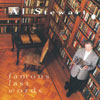AL STEWART : FAMOUS LAST WORDS
- Feel Like
- Angel of Mercy
- Don't Forget Me
- Peter on the White Sea
- Genie on a Table Top
- Trespasse
- Trains
- Necromancer
- Charlotte Corday
- Hipposong
- Night Rolls In
Label : EMI
Time : 47:16
Release Year : 1993
Review (Wikipedia) : Famous Last Words is the fourteenth album by Al Stewart, released in September 1993.
Review (Only Solitaire Blogspot) : Wonderful return to form. Fueled, perhaps, by all the joy that was synthesized on the acoustic duo tour, Stewart finds the strength to ditch most of the production excesses - and delivers a lively, strong, charismatic record, more consistent than anything he's done in years. Almost everything is strictly acoustic-based, with rhythm sections, electric guitar solos and keyboard backdrops swearing complete loyalty to wood, nylon, and human voice. This may add an unwanted whiff of monotonousness to the proceedings, but surely monotonousness is at least preferable to the dozen varieties of excremental sonic effects on Last Days. Although the album is formally dedicated to the memory of the recently deceased keyboardist Peter Wood (Stewart's co-author on 'Year Of The Cat'), it contains two of the most joyous, life-asserting songs Al ever wrote, totally irresistible in their optimistic swirl: 'Feel Like' and 'Genie On A Table Top'. Coming up with hosts of lyrical metaphors to describe his elated spirits - replacing each other in a whirlwind so rapid it is almost impossible to separate the time-tested clichés from brilliant on-the-spot inventions - he infects the backing band with his cheerfulness, and each single musician, from the percussionist to organ and guitar guys taking solo spots, do their best to match him in this celebration of life. After all the chilly, morose panoramas of Last Days, it is the perfect antidote - even though there is no telling as to whatever it really was that made Al feel so wond'rous. The death of Peter Wood?.. These two I-feel-good anthems are the obvious highlights, but Al's sense of melody and taste seems to have picked up on quite a few other occasions as well. 'Angel Of Mercy' is eloquently vicious, staking it all on Al's duet with the ominous violin part (reminiscent somewhat of Dylan's mid-Seventies conversations with Scarlett Rivera's instrument). The inescapable history lesson of 'Charlotte Corday' is a collaboration with Tori Amos that most Tori Amos detractors will like - because she is not singing, merely playing piano, and because the lyrics are his rather than hers. The chorus of 'Trespasser' - "you see him in your dreams, but I seem to see him all the time" - is technically unforgettable, although the song may have used a bit less generic Spanish guitar (what can you do, Al loves the stuff). Even the two-minute kiddie throwaway of 'Hippopotamus Song', which may turn off deadly serious listeners whose sense of humor had been gradually wiped off with a series of Rush concerts, is funny fun in its capriciousness; besides, who else but Al Stewart would flaunt the etymologically correct plural form of the word 'hippopotamus' - and then make it rhyme? Against all this surge of the spirit, the record's few flaws seem even fewer. The gracious, nostalgic folk-rocker 'Trains' has no real reason to drag on for eight minutes; four would have been quite enough - it is certainly no 'Roads To Moscow'. And a couple of the tracks still carry vestiges of crappy Eighties' production - 'Don't Forget Me' still gets pigeonholed as glossy, suffocating adult contemporary, and 'Necromancer' abuses echo effects and electronic percussion in order to remind us that true evil does exist. Yet the tone of the album is still set by 'Feel Like', and a small amount of inertia-based blunders cannot misdirect it. Thumbs up for a record that may brighten up many a day if one so desires, or, perhaps, already has.
